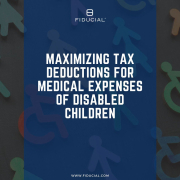Implications of the R&D Tax Policy Changes on Manufacturers Everywhere
- Learn about the changes to R&D tax policy.
- Find out how these R&D tax policy changes will affect the manufacturing industry.
- Learn how these changes will affect Miltec UV, a company that will take a hard hit from the changes.
Do you read the news? If so, you know about a recent R&D tax policy change that will impact the way that research and development (R&D for short) is handled when it comes to income taxes in the United States. Companies must now spread those costs out over a period of 5 years if within the U.S., or 15 years if outside the U.S., rather than deduct them immediately.
Unsurprisingly, these companies affected do not care for the rule change. It has the potential to hurt manufacturers in a number of different ways. Fiducial thinks all of these ways are worth exploring.

The R&D Tax Policy Change: An Overview
In a letter sent November 4, 2022, no less than 178 CFOs – primarily those from some of the biggest names in United States manufacturing like Ford Motor Company, Lockheed Martin, Boeing, and others – outlined why they believe these aforementioned new rules would lead to what they call a "competitive disadvantage" for American companies. This in turn would almost certainly lead to job losses, which would in turn harm their ability to innovate over the next decade.
Their point of view was simple: they were asking the current Congress to switch back to a system that allowed them to immediately deduct their costs when it came to research and development as soon as the end of the year.
It's important to note that in a general sense, research and development investment does not spread evenly across the economy. It tends to be heavily localized in a few key spaces. Manufacturing ranks high among them. In fact, the manufacturing sector alone accounts for 58% of all research and development costs according to one recent study.
To contextualize that in a different way, it means that the manufacturing sector would face a significant tax increase as per the research cited above – to the tune of $31.7 billion in 2023 alone. Manufacturers directly attribute this new approach to R&D amortization.
It's equally important to note that, until January 1, 2022, businesses could deduct 100% of all expenses that are directly attributed to research and development in the same year that they incurred them. On January 1, 2023, this new law went into effect. This essentially makes it more expensive to invest in advancements that will help innovate various sectors like manufacturing. However, it also makes it more expensive to invest in the growth of these companies.
Miltec UV
Many agree this means that the sector won't just take a hit, it will take a significant hit. This is essentially a major new expense. The fact that the tax liabilities of these companies will increase exponentially was not anticipated up to this moment.
One company particularly worried about the implications of this change is Miltec UV. Right now, company leadership believes that an exciting new opportunity is within reach. They have spent years developing new technology for lithium-ion batteries – otherwise known as the rechargeable batteries found in countless devices like smartphones or tablets. This new technology could potentially be used for next-generation electric vehicles.
Miltec UV has poured no less than 11 years of development into manufacturing the electrodes for use in these batteries. They've spent countless amounts of money on prototyping. Various proof of concept developed exists to indicate that these microbes can do what the company thinks they can. There has been testing. On top of it all, there is the cost to manufacture the batteries. Officials agree that they are very close to the point where they can commercialize the batteries and begin to sell them, but with these new rule changes that also means that they will have to pay more taxes than they previously thought they would.

What Happens Next?
In the event that Congress does not reverse these tax changes, industry leaders fear that they will hurt profits in the short term. This could then negatively impact essential benefits that employees at manufacturing companies have come to count on.
For the record, Miltec UV is also an organization that funds all of its research and development efforts through the profits of its various commercial businesses. It has eschewed taking on outside investment in the past and hopes to continue to do so moving forward.
Regardless of whether Congress reverses these changes, one thing is for certain – this is a development that the entirety of the manufacturing industry will be paying close attention to moving forward.
Have questions about how this tax policy change might affect your business? Call Fiducial at 1-866-FIDUCIAL or make an appointment at one of our office locations to discuss your situation.
Ready to book an appointment now? Click here. Know someone who might need our services? We love referrals!









